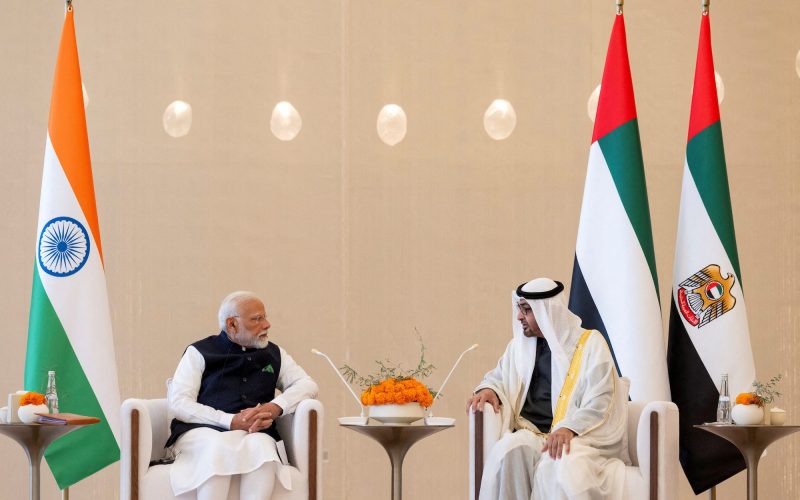Prime Minister Narendra Modi’s visit to the United Arab Emirates to inaugurate a Hindu stone temple in Abu Dhabi highlights both his global diplomatic stature and the political context of India’s upcoming elections. The newly constructed BAPS Hindu Mandir, sprawling over 27 acres in the Abu Dhabi desert, marks a significant milestone as the city’s first traditional Hindu stone temple. Its distinctive pink sandstone columns, adorned with seven spires representing the Emirates’ ruling Sheikhs, symbolize a convergence of cultures and beliefs.
A Symbol of Bilateral Relations

The warmth of Modi’s reception by UAE President Sheikh Mohamed bin Zayed Al Nahyan, including a hug and a Guard of Honor, underscores the strengthening ties between the two nations. Despite Islam being the official religion in the UAE, Modi’s presence at the temple’s inauguration signals the growing synergy in strategic and economic cooperation between India and the Gulf nation.
Political Context: Modi’s Leadership and BJP’s Agenda

While Modi’s visit occurs amidst concerns over the marginalization of Muslims in India under the BJP’s Hindu nationalist policies, analysts anticipate minimal impact on the diplomatic front. Modi’s role in the temple inauguration amplifies his image as a defender of Hinduism, both domestically and internationally. This narrative aligns with his portrayal as a global ambassador of Hindu culture, resonating with his political base and potentially bolstering support ahead of the upcoming elections.
The Significance of the Abu Dhabi Temple
The inauguration of the Abu Dhabi temple follows closely on the heels of the controversial Ram Mandir ceremony in India, symbolizing a shift towards Hindu-centric narratives in the country. The temple’s construction, advocated for by the UAE-based Indian diaspora, reflects a confluence of cultural and political interests. Its completion is not merely a religious milestone but also a testament to India’s growing influence and engagement with its global diaspora.
Strengthening Economic and Strategic Ties

Modi’s frequent visits to the UAE underscore the significance of the bilateral relationship, particularly in economic and strategic realms. India’s efforts to deepen ties with the Middle East, including initiatives such as free trade agreements and infrastructure projects, highlight the region’s growing importance in India’s foreign policy calculus. The UAE’s willingness to engage with India on multiple fronts, including diversifying its strategic partnerships, further solidifies the bilateral relationship.
Despite criticisms of Modi’s domestic policies, particularly regarding minority rights, the UAE is unlikely to raise these issues publicly, adhering to a policy of non-interference in major powers’ domestic affairs. The temple inauguration may not significantly sway Modi’s support base among devout Hindus but could resonate positively in regions with a significant Indian diaspora, potentially influencing electoral dynamics.
Modi’s visit to inaugurate the Abu Dhabi temple symbolizes not only the deepening India-UAE ties but also the intersection of religious, cultural, and political narratives shaping India’s global engagement.













